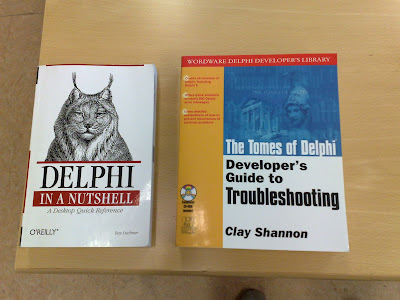This is going to be a short post. Just wanted to share my most important Delphi books in case there are other Java programmers out there who has to maintain Delphi apps.
I like "Delphi in a nutshell". Especially the first two chapters which gives you a brief introduction to Delphi programming, and chapter 5 that is a (big) alphabetical language reference.
Developer's Guide to Troubleshooting is a description of almost 1000 error message that you may get when programming Delphi, design-time, compile-time and run-time error messages. Great reference in case the company Delphi guru is at holiday when some strange error pops up : )

The USB stick below contains articles from issues 1 to 139 of
The Delphi Magazine. There's a lot of well written articles there about different aspects of Delphi programming, including "cool" topics like unit testing and how to set up Delphi build scripts.

Seems like blogging is less common in the Delphi camp, and it seems that
those who do post about Delphi mostly writes for other Delphi developers. If you know anyone else who already blogs about it, please post a comment with a link to it. I would really appreciate it.

